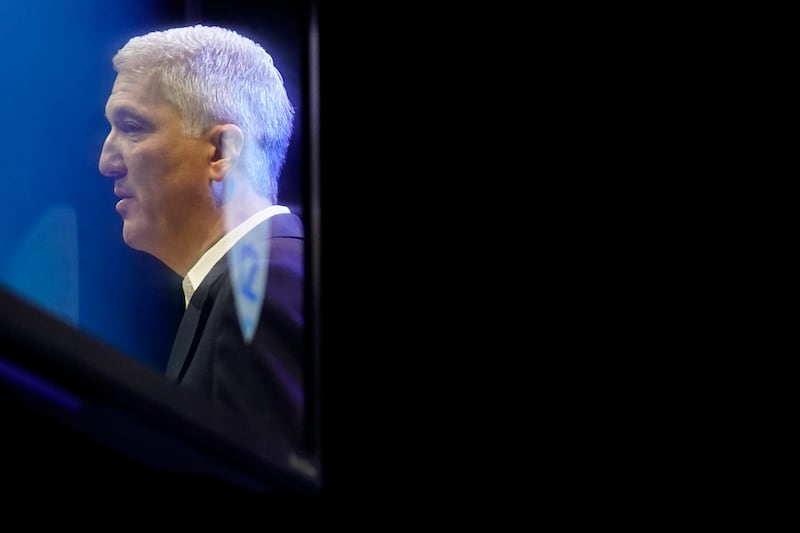There were no absolutes divvied out at Pac-12 media day on Friday in Los Angeles.
None were expected, but the day begged for it.
With what transpired on June 30, Defection Day with USC and UCLA leaving for the Big Ten Conference, that is exactly what many devoted Pac-12 fans craved: Some promises of absolutes.
What we saw was what Billy Witz of The New York Times described as a media day that “carried the air of an awkward family reunion.”
The media affair could have used some absolutes, some hard paper with signatures.
For instance, it would have really helped if commissioner George Kliavkoff could have delivered the following news:
- An announcement that the remaining 10 Pac-12 teams had each agreed to a grant of media rights for the next five, seven or even 10 years.
He could not.
- An announcement of an official first offer money number for each school as pitched by ESPN during negotiations which are due to conclude Aug. 4 during a 30-day evaluation period.
He could not.
- In talking about conference solidarity, eye-to-eye meetings with the league’s board of directors twice a week since June 30, where 10 presidents/chancellors have aired a commitment to stick together, it would have been nice to provide something in writing, something like an affidavit from each team, a document from particularly Oregon, Washington, Cal and Stanford, as to that effect.
He could not.
- Since Big Ten commissioner Kevin Warren aired the theory that his league might not be through expanding and CBS Sports’ Dennis Dodd revealed the league was evaluating Oregon, Washington, Cal and Stanford, it would have been nice for Kliavkoff to provide a letter of clarification from his friend Warren that the Big Ten was not going to poach anybody else.
He could not.
- With almost a month to prepare and to silence rumors, it would have been a solid for Kliavkoff to officially dispel the talk that the Big 12 has not reached out to members or that the so-called Four Corner schools, either directly or through a third-party entity, had not reached out to the Big 12 for expansion consideration.
He could not.
- It would have been elevating to Pac-12 fans to have Kliavkoff announce member schools have not been holding individual closed-door administrative meetings with athletic directors, general counsel (lawyers) and boards of regents to discuss expansion options.
He could not, although Oregonian sportswriter James Crepea said it is well-documented those meetings have taken place.
- By producing a piece of paper declaring if the remaining Pac-12 teams would have an even money distribution in the new media deal, it would have enlightened the pack as decisions on expansion are made.
Kliavkoff had no such guideline ready.
What the Pac-12 needs is some good news, but what’s lacking, and more valuable than all the gold in the world, is trust.
The Pac-12 needs a lot of trust, more than college athletics, in general, has these days.
Now, of course it is too early for many absolute revelations, but can you imagine what Pac-12 media day would have been with a few?
Just a year ago when Oklahoma and Texas announced departure from the Big 12 for the SEC, the Pac-12 had a chance to expand.
A select committee of Pac-12 presidents and athletic directors met to discuss expansion. USC’s president Carol Folt, who was on the committee, “shut it down,” according to the Los Angeles Times.
A year later, Folt, secretly behind backs of her peers, led USC’s inquiry to Big Ten membership. Subsequently, UCLA joined the move via Trojan coattails.
Trust.
The Pac-12 should have learned a lesson last summer from the Big 12 when Oklahoma and Texas bolted for the SEC.
Expansion, which included Houston, BYU, Cincinnati and UCF, was immediate. With prima donnas OU and Texas leaving, the Big 12 was left with eight hungry remaining teams and four eager newcomers who appear to trust each other.
Over the past month, the Pac-12 has learned firsthand what trust in USC and UCLA got them. Now Kliavkoff is left with almost an entire league hoping for trust in meetings while texting contacts in the Big Ten and Big 12 under the table.
Why are we surprised at any of this when our leaders of higher education are so anxious to chase money, leaving behind moral courage and trust?
Wasn’t it just last August that Kliavkoff, fresh on the job he got from disgraced Larry Scott, joined Warren and ACC commissioner Jim Phillips in a video press conference announcing an alliance that would help with scheduling and other initiatives such as a yearlong celebration of Title IX?
In that news conference, these commissioners were asked if there was a binding contract to this agreement.
Kliavkoff said it wasn’t necessary because this was a handshake deal between gentlemen.
Now, after Warren’s Big Ten ravaged the Pac-12, robbing what some say is 28% of its media value in taking USC and UCLA, Kliavkoff must be wondering just who in the world he is dealing with in this college sports deal.
Who are his peers? Who are his friends? Who are his enemies?
You have to feel sorry for Kliavkoff.
Sounds like he’s spinning in an episode of “Narcos” and the Mexican cartels.


